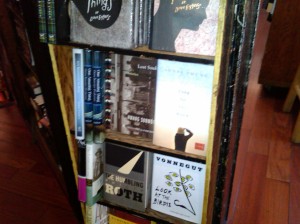21 October 2011
I am obviously late with this, given that the winner of the Man Booker Prize has already been announced (congratulations to the eminent Julian Barnes). But this is fun Friday viewing I couldn’t resist:
This video makes me feel happy, old, and desperate to move to Cambridge, MA so the Harvard Bookstore can be my local bookstore. Thanks, Lisa Peet at Like Fire, for posting!
NYRB Classics
...
4 April 2011
You’ve seen them in your favorite bookstores; usually there’s a special section for them, something like a shrine. They have beautiful covers and the paper stock is somehow more substantial, more serious, than other paperbacks. They are paperbacks that feel like hardcovers, whatever that “means.”
Random House describes the NY Review of Books Classics series thus:
The NYRB Classics series is designedly and determinedly exploratory and eclectic, a mix of fiction and non-fiction from different eras and times and of various sorts. The series includes nineteenth century novels and experimental novels, reportage and belles lettres, tell-all memoirs and learned studies, established classics and cult favorites, literature high, low, unsuspected, and unheard of. NYRB Classics are, to a large degree, discoveries, the kind of books that people typically run into outside of the classroom and then remember for life.
Inevitably literature in translation constitutes a major part of the NYRB Classics series, simply because so much great literature has been left untranslated into English, or translated poorly, or deserves to be translated again, much as any outstanding book asks to be read again.
The series started in 1999 with the publication of Richard Hughes’s A High Wind in Jamaica […] Published in handsome uniform trade paperback editions, almost all the 250 NYRB Classics included in this collection feature an introduction by an outstanding writer, scholar, or critic of our day. Taken as a whole, NYRB Classics may be considered a series of books of unrivaled variety and quality for discerning and adventurous readers.

I discovered the series at The Corner Bookstore in Manhattan, one of the most blessed book places on earth. I have it in my mind to work my way through the entire series someday; but thankfully, I also came across this – a Top 10 NYRB Classics list – over at Conversational Reading.
There’s a subscription club that is looking very irresistible right now… this is one Book Club I can imagine joining.
8 March 2011
I know the title of this post sounds like something from a trade magazine. I actually am a self-proclaimed un-expert on this issue, but I’m trying to get up to speed. According to Publisher’s Weekly (a week or so ago – see, I know, I’m behind), Random House was the last of the big publishing houses to switch to the agency model of e-book pricing:
In the agency model, publishers set the price and designate an agent—in this case the bookseller—who will sell the book and receive the 30% commission. Adopting the model for e-books tends to mean e-book prices will rise, something both publishers and independent retailers applaud. Publishers believe low e-book prices devalue their books and cannibalize hardcover sales. Under the agency model once a price has been set it cannot be changed or discounted by the retailer and independent e-book retailers believe the higher prices of the agency model allow them to compete with big e-book vendors.
What I’m not clear on is why Random House took so long, what were they weighing in terms of the downside of the agency model. I know it’s great for consumers if e-books cost $1.99; but it’s not good for book sales, and thus not good for authors. Some things (this author believes) are worth paying for, and if we value them, we’ll hopefully be willing to do so.
18 January 2010
I thought this Q&A was rather funny, and unexpected, from Jane Smiley (via Gotham Writers’ Workshop):
Q. What is your best method for overcoming writers block?
A. Learning something–either by reading a book or going somewhere or talking or gossiping.
I love the gossipping part! If gossipping can be creatively productive, there’s hope for us all.
Q. What is your favorite or most helpful writing prompt?
A: I always get into the hot tub and read a bit of a novel before I start the day’s work. If I feel reluctant, I reflect on the bills I have to pay. If I feel really reluctant, I time myself and say that I only have to work for an hour.
Lying in the tub and thinking about financial obligations. I love the ironic contradiction of that.
Q. What is the most valuable advice you received as a young writer?
A: Leonard Michaels told me that I had to change my name from my married name (Jane Whiston) to my maiden name (Jane Smiley) because JS was easier to remember and had more personality. I think he was right. My piece of naming advice would be that if your name is Kevin, you need to use another pen name, because the first name Kevin always seems to overwhelm its last name, and so no one can remember which Kevin you are, and therefore cannot find your books on Amazon.
I am only half joking.
This makes me laugh out loud, and then cry a little.
1 September 2010
An interesting piece at Publishers Weekly about fall indie picks (list of 40) and the crucial role that independent booksellers play in helping titles from indie presses break out. One sales rep (whose enthusiasm is identified as having contributed to the success of Paul Harding’s Tinkers), says that the book buyers at Book Passage and City Lights serve as her litmus test for whether an indie can make it.
Read more here.

Long for This World at City Lights this past spring.

